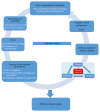A Framework for Describing the Influence of Service Organisation and Delivery on Participation in Fetal Anomaly Screening in England
- PMID: 28421145
- PMCID: PMC5380857
- DOI: 10.1155/2017/4975091
A Framework for Describing the Influence of Service Organisation and Delivery on Participation in Fetal Anomaly Screening in England
Abstract
Objective. The aim of this research was to explore the influence of service organisation and delivery on providers and users' interactions and decision-making in the context of Down's syndrome screening. Methods. A qualitative descriptive study involving online interviews conducted with a purposive sample of 34 community midwives, 35 pregnant women, and 15 partners from two maternity services in different health districts in England. Data were analysed using a combination of grounded theory principles and content analysis and a framework was developed. Results. The main emerging concepts were organisational constraints, power, routinisation, and tensions. Providers were concerned about being time-limited that encouraged routine, minimal information-giving and lacked skills to check users' understanding. Users reported their participation was influenced by providers' attitudes, the ambience of the environment, asymmetric power relations, and the offer and perception of screening as a routine test. Discordance between the national programme's policy of nondirective informed choice and providers' actions of recommending and arranging screening appointments was unexpected. Additionally, providers and users differing perceptions of emotional effects of information, beliefs, and expectations created tensions within them, between them, and in the antenatal environment. Conclusions. A move towards a social model of care may be beneficial to empower service users and create less tension for providers and users.
Figures
Similar articles
-
Midwives' perceptions of their role as facilitators of informed choice in antenatal screening.Midwifery. 2013 Jul;29(7):745-50. doi: 10.1016/j.midw.2012.07.006. Epub 2012 Aug 15. Midwifery. 2013. PMID: 22901497
-
Routinisation and constraints on informed choice in a one-stop clinic offering first trimester chromosomal antenatal screening for Down's syndrome.Midwifery. 2011 Aug;27(4):431-6. doi: 10.1016/j.midw.2010.02.011. Epub 2010 Oct 13. Midwifery. 2011. PMID: 20947230
-
Reasons for accepting or declining Down syndrome screening in Dutch prospective mothers within the context of national policy and healthcare system characteristics: a qualitative study.BMC Pregnancy Childbirth. 2016 May 26;16(1):121. doi: 10.1186/s12884-016-0910-3. BMC Pregnancy Childbirth. 2016. PMID: 27229318 Free PMC article.
-
Domestic violence in pregnancy: midwives and routine questioning.Pract Midwife. 2016 Jan;19(1):26-9. Pract Midwife. 2016. PMID: 26975130 Review.
-
The Psychological Well-being of Pregnant Women Undergoing Prenatal Testing and Screening: A Narrative Literature Review.Hastings Cent Rep. 2019 May;49 Suppl 1:S53-S60. doi: 10.1002/hast.1017. Hastings Cent Rep. 2019. PMID: 31268571
Cited by
-
Factors influencing pregnant women's decision to accept or decline prenatal screening and diagnosis - a qualitative study.J Community Genet. 2024 Dec;15(6):711-721. doi: 10.1007/s12687-024-00746-3. Epub 2024 Nov 1. J Community Genet. 2024. PMID: 39485622 Free PMC article.
-
Non-invasive prenatal test uptake in socioeconomically disadvantaged neighborhoods.Prenat Diagn. 2021 Oct;41(11):1395-1400. doi: 10.1002/pd.6043. Epub 2021 Sep 14. Prenat Diagn. 2021. PMID: 34505288 Free PMC article.
References
-
- NHS FASP. Fetal Anomaly Screening Programme: Consent Standard and Guidance. 2011. http://fetalanomaly.screening.nhs.uk/standardsandpolicies.
-
- NICE. Antenatal care: Routine care for the healthy pregnant woman. Full guideline. National Institute for Health and Clinical Evidence. 2008, http://www.nice.org.uk/guidance/index.jsp?action=byID&o=11947.
-
- Pilnick A. ‘It's just one of the best tests that we've got at the moment’: the presentation of nuchal translucency screening for fetal abnormality in pregnancy. Discourse & Society. 2004;15(4):451–465. doi: 10.1177/0957926504043710. - DOI
MeSH terms
LinkOut - more resources
Full Text Sources
Other Literature Sources
Medical



